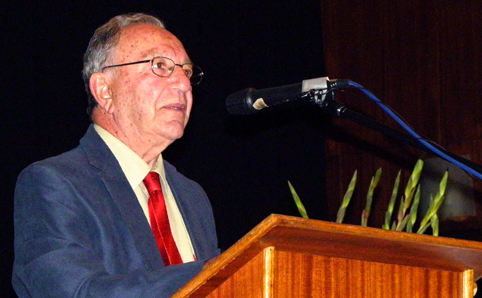Latest News Archive
Please select Category, Year, and then Month to display items
20 December 2021
|
Story Igno van Niekerk
|
Photo Igno van Niekerk
![]() Dr Samantha Potgieter, Senior Lecturer in the Department of Internal Medicine and Dr Nicholas Pearce, Senior Lecturer in the Department of Surgery comment on their team members’ commitment and determination during the pandemic.
Dr Samantha Potgieter, Senior Lecturer in the Department of Internal Medicine and Dr Nicholas Pearce, Senior Lecturer in the Department of Surgery comment on their team members’ commitment and determination during the pandemic.
On the forefront of the battle against the COVID-19 pandemic, two UFS doctors are leading a team of inspired healthcare workers in a superhuman effort to make a positive difference.
With the pandemic in its second year and the recurring challenges of new waves and strains consistently in the news, one would expect the doctors to be tired. However, quite the opposite is true. Upon entering the office where Dr Samantha Potgieter, Senior Lecturer in the Department of Internal Medicine and Dr Nicholas Pearce, Senior Lecturer in the Department of Surgery are in a meeting with colleagues, the debate is vibrant; an energetic sense of mission.
Miraculously succeeded
My brief is to collect stories and experiences they’ve had over the past 18 months at the Tumelo ward for general and high-care patients, where the team has miraculously succeeded in not running out of oxygen or ventilators, despite handling high volumes of patients from the Free State and Northern Cape. “We saw those pictures of piled-up bodies in Italy. We were committed to avoiding that at all costs. And we did.”
Success stories? First mentioned are their team members’ commitment and determination. The team had to stand in when families could not support dying patients. “They did not die alone. Our team was there.”
“Really sad and frustrating are the deaths that could have been prevented. Unvaccinated patients. They arrive ill, wanting to know if they can get it. Too late...” – Dr Nicholas Pearce
Then came hope
Sad stories? The past year has had its share of sad stories. “Someone comes in during the morning, needs oxygen, in the afternoon they are in ICU, then ventilator – and then they die. We’ve never faced anything like this before.”
Then came hope. Vaccines. Dr Pearce is in charge of the vaccination site at Universitas Hospital. “Really sad and frustrating are the deaths that could have been prevented. Unvaccinated patients. They arrive ill, wanting to know if they can get it. Too late ...” He opens his cell phone – shares the stats. “We can handle 2 000 vaccinations a day. At the moment about 250 comes in.” He shakes his head.
“We can beat this virus, but we need to stand together ...”
UFS hosts final ANC Centenary Seminar for 2011
2011-11-28
 |
|
Prof. Benjamin Turok speaking about the Evolution of Economic Policy Thinking.
Photo: Henco Myburgh
|
The African National Congress (ANC) government is faced with the dilemma of an inherited distorted economy. Subsequently South Africa has the most unequal society in the world. That is according to Prof. Benjamin Turok, head of Political Education for the ANC in Parliament. Prof. Turok spoke at an ANC Centenary Dialogue at the Bloemfontein Campus of the University of the Free State (UFS) on 23 November 2011.
Delivering the last lecture of the year in a series of dialogues about the ANC, Prof. Turok said it was hard to swallow that after 100 years there is still inequality. This for a party whose essence is the notion of sharing, as set out in the Freedom Charter. Prof. Turok told the audience in a packed Odeion Theatre that the ANC Centenary provided a moment of reflection. “If we neglect the poor and uneducated and do not interfere and direct investment, we will always have inequality.”
Talking about youth unemployment, Prof. Turok said that no society can live in peace if young people are not employed. He said that he welcomed the energy the ANC Youth League has put in economic policy, but would like to see a youth league economic policy that is scientific.
The ANC Centenary Dialogue series has been hosted by the Centre for Africa Studies and will continue on 15 February 2012.